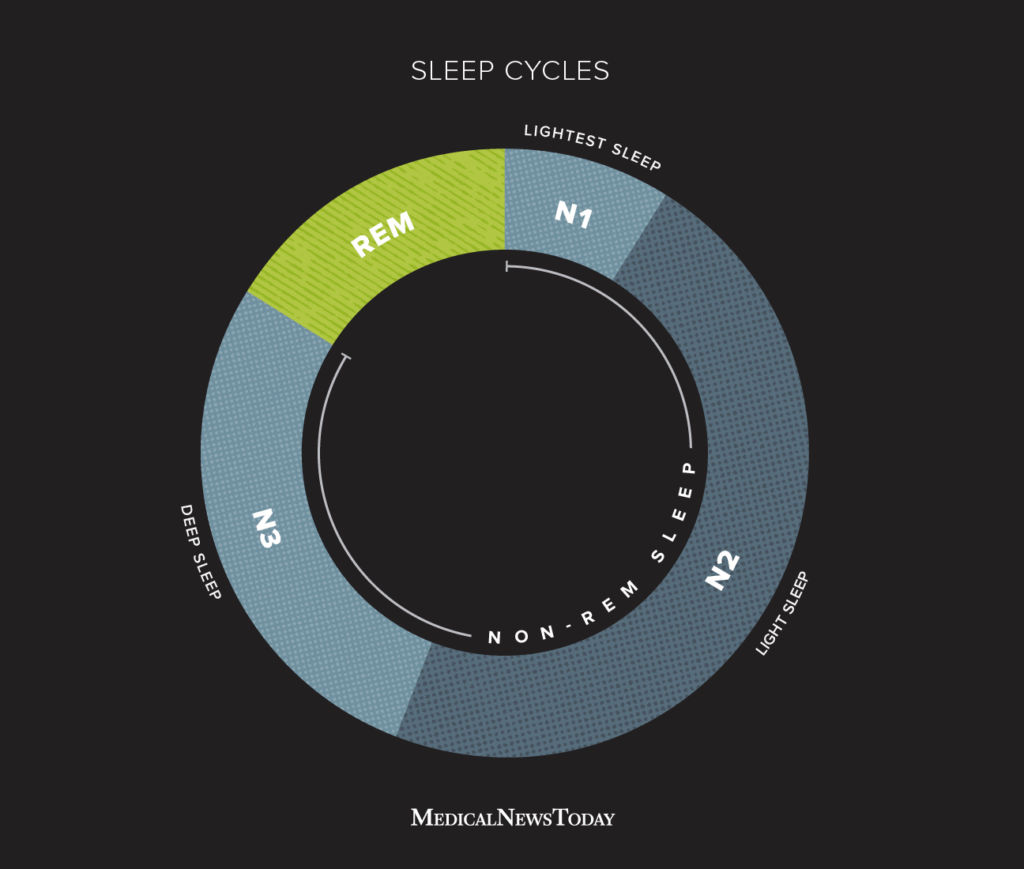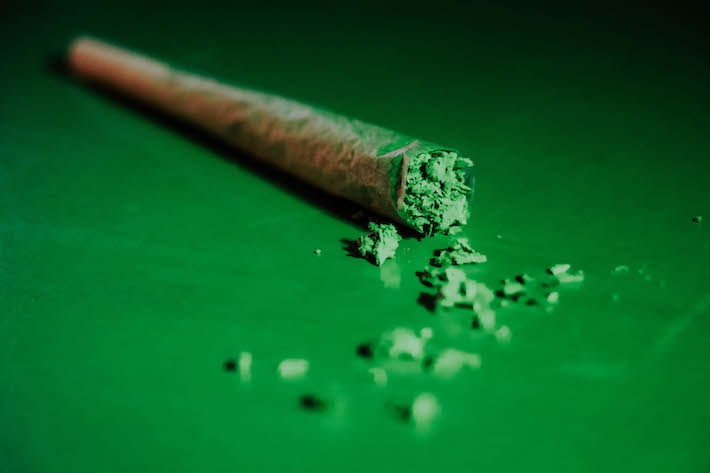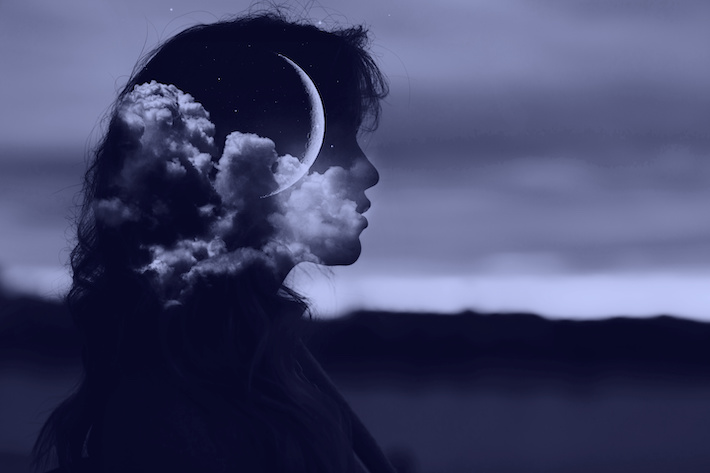Dreams are one area where your assumptions about cannabis are often wrong. Naively, you might assume that your dreams would be vivid or otherwise especially interesting if you go to bed high, but this is actually pretty far from the truth.
In reality, there is quite a bit of evidence – both anecdotal and clinical – that cannabis actually reduces dreaming altogether. This might be surprising (and an interesting discussion on its own), but it offers a potential solution for people struggling with nightmares as a result of PTSD or other issues.
TL;DR
- There are four main stages to sleep, which repeat multiple times through the night, including REM sleep (i.e. dream sleep).
- Cannabis, and specifically THC, can suppress REM sleep. This leads to many regular users not remembering dreams at all.
- When you have very little REM sleep, you will experience a REM rebound as soon as your body gets the opportunity. This happens to people taking tolerance breaks or otherwise stopping using cannabis.
- THC has the biggest impact on dreaming, but CBD can also have a role to play by reducing anxiety.
- Research has confirmed that a THC-like molecule can help reduce the recurring nightmares that come with PTSD.
The Stages of Sleep and REM

Each night, you cycle through four different stages of sleep multiple times.
- The first stage is basically the transition between being awake and being asleep, so your breathing and heartbeat slow down and your muscles start to relax.
- In stage 2, you transition between the lighter stage 1 sleep and deeper stage 3 sleep, with further relaxation as in stage 1, except with reduced brain activity, reduced body temperature and no eye movement.
- Stage 3 is “deep sleep,” continuing in the reduction in activity that you had in stages 1 and 2, and contributing to the feeling of being refreshed and well-rested in the morning.
- Stage 4 is generally called REM sleep, which stands for Rapid Eye Movement. While the muscles in your arms and legs are paralyzed through this stage, your brain becomes about as active as it is when you’re awake, and your heart rate, breathing and blood pressure reach waking levels. As the name suggests, your eyes move rapidly under your eyelids during this stage, and it’s when most dreaming occurs. This usually happens about 90 minutes after you fall asleep.
Since the process is much shorter than the whole 8 hours you’ll be asleep, the cycle repeats several times through the night. This means that you will have several dreams on an average night, it’s just that you don’t remember the majority of them, unless you wake up regularly through the night.
Cannabis and REM Sleep

So with the basics down, it’s clear that if cannabis has an impact on dreaming, it must have an effect on REM sleep. This is basically what happens. Cannabis suppresses REM sleep, to the point where many regular smokers don’t recall having dreams at all. Essentially it reduces the amount of time you spend in REM sleep, which prevents you from being able to dream in most cases, although it is certainly still possible (and it doesn’t appear to affect everybody). It also increases the amount of time between falling asleep and entering REM sleep (called REM latency), as well as increasing the “bizarreness” of any dreams people do recall.
If you’re having nightmares, this could easily be a good thing for you. However, it’s worth noting that dreams likely do serve a purpose for us, although it’s not exactly clear what that is. The leading theory at present is that REM sleep is how our bodies “sort” and essentially process the images and memories of the day, helping work through emotional aspects and trying out solutions to problems. As Dr. Jordan Tishler (CEO of the Association of Cannabis Specialists) points out to Leafly, REM deprivation can lead to cognitive issues and affect your mood.
So generally speaking, cannabis can definitely have an impact on your REM sleep, but over the long term this could turn out to be a bad thing.
REM Rebounds

One thing that really underlines the importance of REM sleep is the phenomenon of REM rebounds. When you don’t get enough REM sleep for one reason or another, your body “catches up” by making you have an excessive amount when you get the opportunity. This happens after a long period of sleep deprivation, for example: you’ll go into REM sleep very soon after falling asleep and you’ll spend longer than usual in the stage. It’s like your brain has a REM debt and is paying it off.
The same thing happens when you take a tolerance break or otherwise stop using cannabis. People report having intense and vivid dreams, as the brain tries to pay off the REM debt from the weed over the past days, weeks or months. When this happened to me personally it continued for around a week before settling down to regular dreams, and I explicitly remember vibrant colors, a surprising amount of detail and broadly a very “real” feeling to the dreams.
Which Cannabinoids Are Involved? THC or CBD?
Since there are tons of different cannabinoids in cannabis, it’s worth thinking in more detail about what is having the effect on REM sleep. Overall, it appears that the REM suppression effect is largely due to THC, but with many people using CBD for sleep-related issues, it’s worth asking what role it plays too.
Research suggests that CBD can have an impact on REM sleep, but this is dependent on dosage and can go in either direction. A high dose of CBD increased REM latency on the night people took it, while a medium dose reduced REM latency the day afterwards. This is a little confusing, though, and it’s likely more to do with the limited research available on the topic than this specific pattern being a general rule.
However, another study looked at people who had REM suppression due to anxiety, and they found that CBD reduced this suppression, basically because of its known ability to reduce anxiety. There are also anecdotal suggestions that CBD leads to more vivid and lucid dreams, and better recall of dreams in the morning.
Can Cannabis Help with Recurring Nightmares?
Generally it’s pretty clear that both THC and CBD have some impact on your sleep cycle, and notably impact REM sleep. This raises the interesting question for people struggling with recurring nightmares. This can be an understandably troubling issue, caused by stress, anxiety, depression, some medical conditions, medications, drugs, or PTSD. In fact, about 7 in 10 people who suffer from PTSD report having recurring nightmares, and these lead to worsening symptoms, can increase depression and make it hard to get a good night’s sleep.
Given the suppressing effect of THC on REM sleep, it should be kind of obvious that it could help with the problem. While there are issues suppressing REM sleep altogether, it could debatably be preferable, as Dr. Tishler pointed out to Leafly: “For patients who have nightmares, such as those with PTSD, some amount of REM suppression may be good.”
There has also been a direct test of this idea. The study used nabilone – a synthetic cannabinoid which mimics THC – to investigate the effects of cannabinoid medications on treatment-resistant nightmares in PTSD patients. There were 47 participants in the study in total, and they had already received antidepressants and hypnotics, with no impact on their nightmares.
After receiving nabilone, 72% of the patients either reported a significant reduction in the intensity of their nightmares or that they stopped having them altogether. They also reported subjective improvements in quality of sleep, sleep time, reduced night-sweats and fewer daytime flashbacks.
So overall, it does appear to be the case that cannabis could help people experiencing recurring nightmares. However, it’s important to note that if you’re suffering from PTSD, getting professional support is crucial, and other interventions such as cognitive behavioral therapy are also effective. Certainly, if you’re in a legal state and your therapist and/or doctor is on board with the idea, you can try using cannabis to reduce the nightmares, but it’s important to discuss the option rather than just “going it alone” to try and solve the problem.
If your nightmares are related to anxiety, it’s also possible that CBD could be helpful in reducing them. While it doesn’t directly reduce your REM sleep time in the way THC does, reducing the anxiety creating the problem could rectify the issue, and is certainly worth trying out.
Conclusion
While it might be a bit of a surprising finding based on people’s assumptions about cannabis, it’s true that it has potential for reducing nightmares, mainly because THC reduces dreams of all types. It isn’t exactly ideal to not dream – especially if you don’t have an issue with nightmares – but in some limited cases, like people suffering from PTSD and struggling with persistent nightmares, having a deficit of REM sleep can certainly be preferable to the alternative. It’s important to discuss the possibility with your doctor, but there is enough evidence to suggest it could genuinely help.

